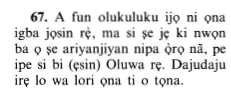22vs67
Select any filter and click on Go! to see results
لِكُلِّ أُمَّةٍ جَعَلْنَا مَنسَكاً هُمْ نَاسِكُوهُ فَلَا يُنَازِعُنَّكَ فِي الْأَمْرِ وَادْعُ إِلَى رَبِّكَ إِنَّكَ لَعَلَى هُدًى مُّسْتَقِيمٍ
Likulli ommatin jaAAalna mansakan hum nasikoohu fala yunaziAAunnaka fee alamri waodAAu ila rabbika innaka laAAala hudan mustaqeemin
Yoruba Translation

Hausa Translation
Ga kõwace al´umma Mun sanya wurin yanka, su ne masu yin baiko gare Shi, sabõda haka, kada su yi maka jãyayya a cikin al´amarin (hadaya). Kuma ka yi kira zuwa ga Ubangijinka lalle kai kana a kan shiriya madaidaiciya.
Asbabu n-Nuzuul (Occasions of Revelation)
Every Nation has its Religious Ceremonies
Allah tells:
لِكُلِّ أُمَّةٍ جَعَلْنَا مَنسَكًا هُمْ نَاسِكُوهُ فَلَا يُنَازِعُنَّكَ فِي الْأَمْرِ ...
For every nation We have made Mansak which they must follow; so let them not dispute with you on the matter,
Allah tells us that He has made Mansak for every nation.
Ibn Jarir said,
"This means that there are Mansak for every Prophet's nation.''
He said,
"The origin of the word Mansik in Arabic means the place to which a person returns repeatedly, for good or evil purposes. So the Manasik (rites) of Hajj are so called because the people return to them and adhere to them.''
If the phrase "For every nation We have ordained religious ceremonies'' means that every Prophet's nation has its religious ceremonies as ordained by Allah, then the phrase "So let them (the pagans) not dispute with you on the matter'' refers to the idolators.
If the phrase "For every nation We have ordained religious ceremonies'' means that it is the matter of Qadar (divine decree), as in the Ayah, وَلِكُلٍّ وِجْهَةٌ هُوَ مُوَلِّيهَا (For each nation there is a direction to which they face). (2:148)
Allah says here: هُمْ نَاسِكُوهُ (which they Nasikuh) meaning, which they must act upon. The pronoun here refers back to those who have these religious ceremonies and ways, i.e., they do this by the will and decree of Allah, so do not let their dispute with you over that divert you from following the truth.
Allah says:
... وَادْعُ إِلَى رَبِّكَ إِنَّكَ لَعَلَى هُدًى مُّسْتَقِيمٍ ﴿٦٧﴾
but invite them to your Lord. Verily, you indeed are on the straight guidance.
i.e., a clear and straight path which will lead you to the desired end.
This is like the Ayah:
وَلاَ يَصُدُّنَّكَ عَنْ ءَايَـتِ اللَّهِ بَعْدَ إِذْ أُنزِلَتْ إِلَيْكَ وَادْعُ إِلَى رَبِّكَ
And let them not turn you away from the Ayat of Allah after they have been sent down to you: and invite to your Lord. (28:87)
يخبر تعالى أنه جعل لكل قوم منسكا قال ابن جرير يعني لكل أمة نبي منسكا قال : وأصل المنسك في كلام العرب هو الموضع الذي يعتاده الإنسان ويتردد إليه إما لخير أو شر قال ولهذا سميت مناسك الحج بذلك لترداد الناس إليها وعكوفهم عليها فإن كان كما قال من أن المراد لكل أمة نبي جعلنا منسكا فيكون المراد بقوله " فلا ينازعنك في الأمر " أي هؤلاء المشركون وإن كان المراد " لكل أمة جعلنا منسكا " جعلا قدريا كما قال " ولكل وجهة هو موليها " ولهذا قال ههنا " هم ناسكوه " أي فاعلوه فالضمير ههنا عائد على هؤلاء الذين لهم مناسك وطرائق أي هؤلاء إنما يفعلون هذا عن قدر الله وإرادته فلا تتأثر بمنازعتهم لك ولا يصرفك ذلك عما أنت عليه من الحق ولهذا قال " وادع إلى ربك إنك لعلى هدى مستقيم " أي طريق واضح مستقيم موصل إلى المقصود وهذه كقوله " ولا يصدنك عن آيات الله بعد إذ أنزلت إليك وادع إلى ربك " .
"لكل أمة جعلنا منسكا" بفتح السين وكسرها شريعة "هم ناسكوه" عاملون به "فلا ينازعنك" يراد به لا تنازعهم "في الأمر" أي أمر الذبيحة إذ قالوا : ما قتل الله أحق أن تأكلوه مما قتلتم "وادع إلى ربك" إلى دينه "إنك لعلى هدى" دين
أي شرعا .
I'raab - grammatical analysis of the Qur'an
«لِكُلِّ أُمَّةٍ» متعلقان بجعلنا وهما سدا مسد مفعوله الثاني «جَعَلْنا» ماض وفاعله والجملة مستأنفة «مَنْسَكاً» مفعول به أول «هُمْ» مبتدأ «ناسِكُوهُ» خبر مرفوع بالواو لأنه جمع مذكر سالم والهاء مضاف إليه وحذفت النون للإضافة والجملة صفة لمنسكا «فَلا» الفاء الفصيحة ولا ناهية «يُنازِعُنَّكَ» مضارع مجزوم بلا الناهية وعلامة جزمه حذف النون والواو فاعل وحذفت لالتقاء الساكنين والنون نون التوكيد الثقيلة ولم تعمل هنا لأنها لم تباشر الفعل المضارع والجملة جواب الشرط المقدر لا محل لها «فِي الْأَمْرِ» متعلقان بينازعنك «وَادْعُ» الواو عاطفة وفعل أمر فاعله مستتر «إِلى رَبِّكَ» متعلقان بادع والكاف مضاف إليه والجملة معطوفة «إِنَّكَ» إن واسمها «لَعَلى هُدىً» متعلقان بالخبر المحذوف واللام المزحلقة «مُسْتَقِيمٍ» صفة هدى والجملة مستأنفة
